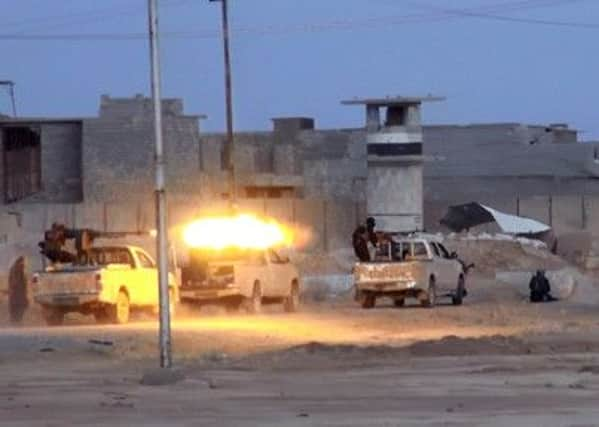Obama backing for military action in Iraq


Mr Obama said there were “short-term” actions which “need to be done militarily” to prevent jihadists securing a “permanent foothold in Iraq, or Syria for that matter”.
The wider international community has so far been reluctant to become involved in the conflict, which has forced hundreds of thousands of people to flee their homes as militants drive south to the capital. But asked whether the US was considering drone strikes or other action to curb the insurgency in a country on the brink of civil war, he said: “I don’t rule anything out.”
Advertisement
Hide AdAdvertisement
Hide AdEarlier, Foreign Secretary William Hague stated that Britain “will not be getting involved militarily” but did vow to “support the United States in anything they decide to do”.
On another day of unrest in the north of the Iraq, well-equipped fighters from the Islamic State of Iraq and al-Sham (Isis) captured two key Sunni-dominated cities and vowed to intensify its assault on the Shiite-dominated Iraqi government by marching on Baghdad.
And Kurdish peshmerga fighters overran the major oil producing city of Kirkuk yesterday as government troops abandoned their posts after Mosul and Tikrit fell to the Sunni Islamist insurgents.
Jabbar Yawar, a spokesman for the peshmerga, said its security forces had taken control of bases in the city vacated by the army. He said: “The whole of Kirkuk has fallen into the hands of peshmerga. No Iraqi army remains in Kirkuk now.”
The last US forces withdrew from Iraq in December 2011, and last night White House spokesman Jay Carney said the US is not contemplating sending ground troops.
Nato secretary general, Anders Fogh Rasmussen, said he did “not see a role” for the organisation in Iraq. But French foreign minister, Laurent Fabius, said international powers “must deal with the situation”.
Iraqi prime minister, Nouri al-Maliki, has made several requests to the US in recent weeks to launch airstrikes on areas occupied by militants, which have so far been rebuffed.
The scale of the challenge faced by his administration in tackling the insurgency was laid bare yesterday when an extraordinary session of its parliament ended without granting the government emergency powers.
Advertisement
Hide AdAdvertisement
Hide AdOnly 128 MPs out of a total of 325 turned up for the vote – a sign of the sectarian stand-off that is crippling the country’s political workings.
The million-strong Iraqi army, trained by the US at a cost of nearly £15 billion, is hobbled by low morale and corruption.
In Mosul, Isis forces staged a parade of US Humvee armoured vehicles seized from the collapsing Iraqi army since the nation’s second biggest city was overrun.
Further south, the fighters extended their lightning advance to towns only an hour’s drive from Baghdad, where Shiite militia are mobilising for a potential replay of the ethnic and sectarian bloodbath of 2006 and 2007, with trucks carrying Shiite volunteers approaching the capital’s frontlines.
Earlier yesterday, Iraqi state television showed what it said was aerial footage of Iraqi aircraft firing missiles at insurgent targets in Mosul. The targets could be seen exploding in black clouds.
A spokesman for the al- Qaeda-inspired Isis said they would now march on Baghdad to settle scores with Mr al-Maliki’s government. He also threatened that Isis fighters will take the southern cities of Karbala and Najaf, which hold two of the holiest shrines for Shiite Muslims.
Isis has issued a triumphalist statement declaring that it would start implementing its strict version of Shariah law in Mosul and other regions it had overrun.
It said women should stay in their homes for modesty reasons, warned it would cut off the hands of thieves and told residents to attend daily prayers.
Advertisement
Hide AdAdvertisement
Hide AdIt told Sunnis in the military and police to abandon their posts and “repent” or else “face only death”.
Amid growing international tension over the developments, Mr Hague said it was primarily the responsibility of the Iraqi government to deal with the crisis. He said: “Britain won’t be getting involved militarily in this situation. We are considering if we need to send humanitarian aid.
“We are very concerned about the hundreds of thousands of people who have been displaced. With our very large humanitarian budget, we may be in a position to assist with that and we are looking at that now.”
Deputy Prime Minister Nick Clegg said he too would resist any call to send troops to the country, where the UK took part in a US-led invasion to oust dictator Saddam Hussein in 2003.
“I don’t think having made one mistake, you repeat it by making a second one,” he said.
Russian foreign minister Sergei Lavrov said the rapid advances made by the insurgents proved the military invasion of Iraq 11 years ago had been a fiasco.